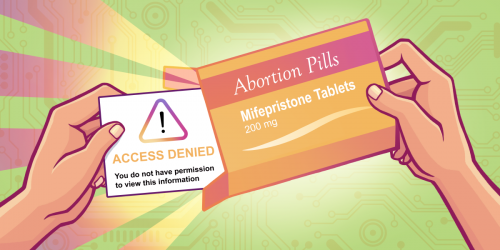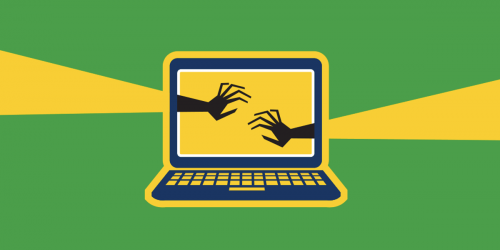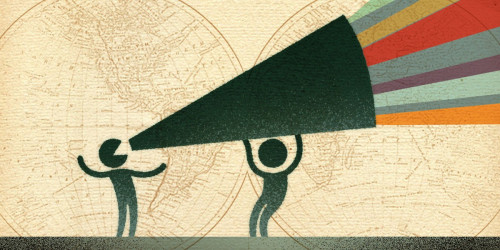Join EFF on April 4th for 404 Day, a nation-wide day of action to call attention to the long-standing problem of Internet censorship in public libraries and public schools. In collaboration with the MIT Center for Civic Media and the National Coalition Against Censorship, we are hosting a digital teach-in with some of the top researchers and librarians working to analyze and push back against the use of Internet filters on library computers.
For over a decade public libraries and public schools have been censoring the Internet by blocking and blacklisting websites to be in compliance with the Children's Internet Protection Act (CIPA). The law was passed to encourage public libraries and schools to filter child pornography and obscene or “harmful to minors” images from the library’s Internet connection in exchange for federal funding.
Unfortunately, aggressive interpretations of CIPA have resulted in extensive and unnecessary censorship in our cherished public libraries, often because libraries, for fear of violating the law, go beyond the legal requirements of CIPA when implementing content filters. As a result, students and library patrons across the country are routinely and unnecessarily blocked from accessing constitutionally protected websites, like the websites of art museums or sites with vitally important health information.
CIPA requires libraries that accept federal funds from the e-rate program and grants from Library Services and Technology Act to adopt an Internet safety policy that incorporates the use of filtering and blocking software on public and staff computers.
The intent of the law is that the filters will block access to access to obscene content and child pornography and prevent minors from accessing explicit sexual images that lack any serious artistic, political, literary, or scientific value. However, Internet filters lead to First Amendment violations, because Internet filters cannot possibly make the legal distinctions between assertedly “harmful,” but constitutionally protected, content, and content that can legally be prohibited. Examples of lawful content being blocked by Internet filters abound. Websites have been blocked that host medical information about breast cancer, chicken breasts, and even a New York Times article about Internet gambling all due to keyword blocking.
Aside from CIPA, an additional problem arises with libraries that have implemented discretionary filtering. Libraries have blocked websites about Wiccan, Native American spirituality, and astrology, as well as the sites that contain information about LGBTQ communities, youth tobacco usage, art galleries, and Second Amendment advocacy. While adult patrons can request for library filters to be turned off, all too often patrons have no idea that their library’s Internet is censored. And to make matters worse, sometimes librarians are unaware of how to turn filters off. Many librarians do not have access to lists of what's being filtered or the reasoning behind it.
And when it comes to blocking obscene images, filters are often ineffective. A study (PDF) conducted by the San Jose Public Library of available filtering technology in 2008 showed that images of an adult sexual nature continued to display despite the use of filters because of the way image search engines show thumbnails that are not treated as images by filtering programs and often can be expanded to full size.
The deficiency of filters made headlines in 2011 when Homesafe, a network level filter provided by an ISP in Britain designed to block adult sexual content failed to block Pornhub, which offers thousands of free explicit videos and is ranked as the third largest pornography provider on the web.
This is why EFF is calling on librarians, students, and concerned library patrons across the country to take action on 404 Day to raise awareness and call attention to banned websites and Internet censorship in libraries. Please join us at 12:00pm PST/ 3:00pm EST for a digital teach-in featuring Deborah Caldwell-Stone, Director of Intellectual Freedom at the American Library Association, Chris Peterson from MIT's Center for Civic Media and the National Coalition Against Censorship, and Sarah Houghton, blogger and Director of the San Rafael Public Library in Northern California for an in-depth discussion about banned websites in public schools and libraries. EFF's own April Glaser will moderate, and we'll post a link for the teach-in on EFF's site prior to the event, but for now, mark your calendars!
But that's only half of it: bloggers and librarians across the country are invited to write about their experiences with blocked websites, CIPA, and Internet filtering. EFF will link to and share blogposts written for 404 Day on our website and use our megaphone to raise awareness, share stories, and start conversations about how librarians might deal with filtering and censorship in their libraries. Let us know if you want to write a blogpost for 404 Day or send a link when it's written to april@eff.org so we can include it in our list and spread the word.
In our teach-in we'll talk about research that's being conducted to understand how and why certain websites are blacklisted, what librarians have done to oppose Internet censorship in their library system, how to inform patrons about filters used in their libraries, and discuss the specific requirements of CIPA and legal challenges to library censorship.
That's why Chris Peterson's investigative research like the Mapping Information Access Project is critically important. He's part of a team that is submitting Freedom of Information Act requests to public libraries and schools to uncover practices of Internet filtering. Another one of our digital teach-in participants, Deborah Caldwell-Stone, a lawyer with the ALA, has long written about and investigated CIPA and related First Amendment violations that result from websites blocked in libraries. Sarah Houghton, the Director of San Rafael Public Library, will share her story of how she lobbied her library system (in San Jose at the time) to not install Internet filters on their computers.
So be sure to pencil in your calendars for our digital teach-in on 404 Day, blog about it, invite your friends to blog about it, share it on social media, and help us call attention to censorship in libraries and schools. CIPA might be over a decade old, but that doesn't mean that library Internet censorship is permanent. Together, we can raise awareness and call attention to this critically important issue. Join us.
Want to blog on April 4th for 404 Day? Email april@eff.org to let us know.








